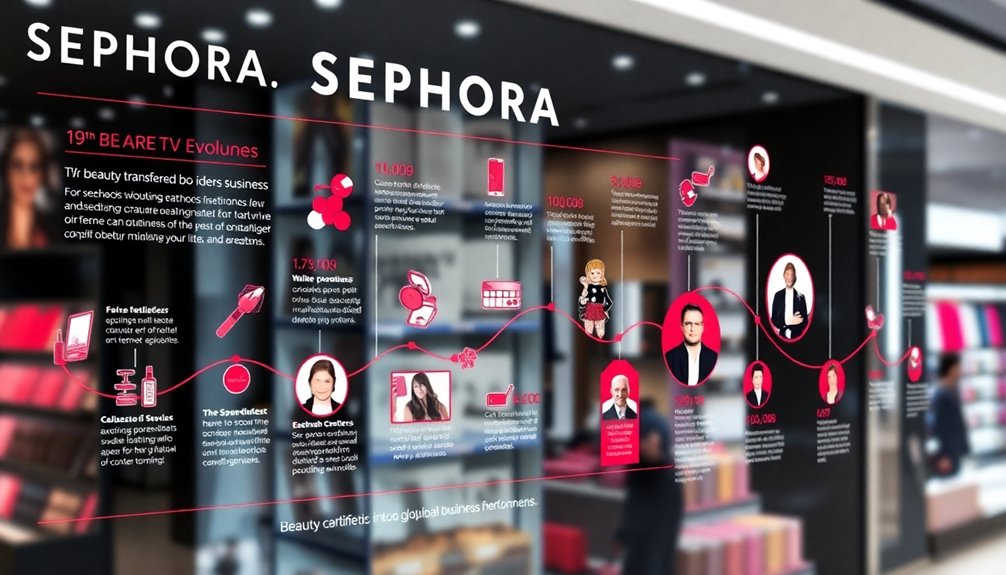Sephora started as a simple beauty shop in France in 1969, founded by Dominique Mandonnaud. Inspired by the concept of "try before you buy," it quickly gained popularity. After being acquired by LVMH in 1993, Sephora expanded globally, opening flagship stores and launching its own product line. Today, it operates in 35 countries, boasting a diverse range of over 340 brands. With innovative retail strategies and a strong digital presence, Sephora continues to thrive. It's fascinating how this brand transformed the beauty industry. You'll discover even more about its remarkable history and success ahead.
Key Takeaways
- Founded in 1969 by Dominique Mandonnaud, Sephora introduced the innovative "try before you buy" concept in its open-sell environment.
- Acquired by LVMH in 1997, Sephora expanded globally, generating approximately $16 billion in retail sales worldwide by 2023.
- Launched the Sephora Collection in 1995, diversifying product offerings and catering to a wide range of beauty preferences.
- Implemented strategic store-in-store partnerships with retailers like JCPenney and Kohl's to enhance market presence since 2006.
- Current President Artemis Patrick is set to become CEO in 2024, continuing Sephora's legacy of innovation and growth in the beauty industry.
Founding and Early Years
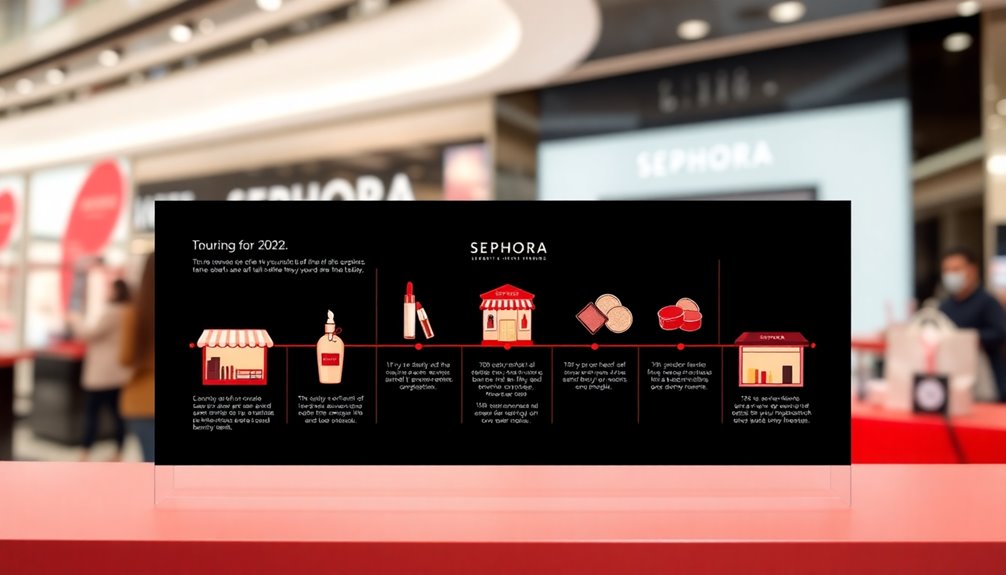
Sephora's journey began in 1969 when Dominique Mandonnaud founded the company, driven by a passion for beauty.
He opened the first store in Limoges, France, in the early 1970s, and named it "Sephora," inspired by the Greek word for beauty and the biblical figure Zipporah.
Coming from a family involved in the perfume business, Mandonnaud initially focused on perfumes and fragrances.
His innovative approach introduced the concept of "try before you buy," allowing you to test products before making a purchase.
This pioneering model set Sephora apart from traditional department stores, creating an open-sell environment where you could interact directly with products.
Knowledgeable staff played a crucial role, enhancing your shopping experience. In 1993, the company was sold to a luxury goods conglomerate, LVMH, which helped with Sephora's global expansion.
Expansion and Innovation
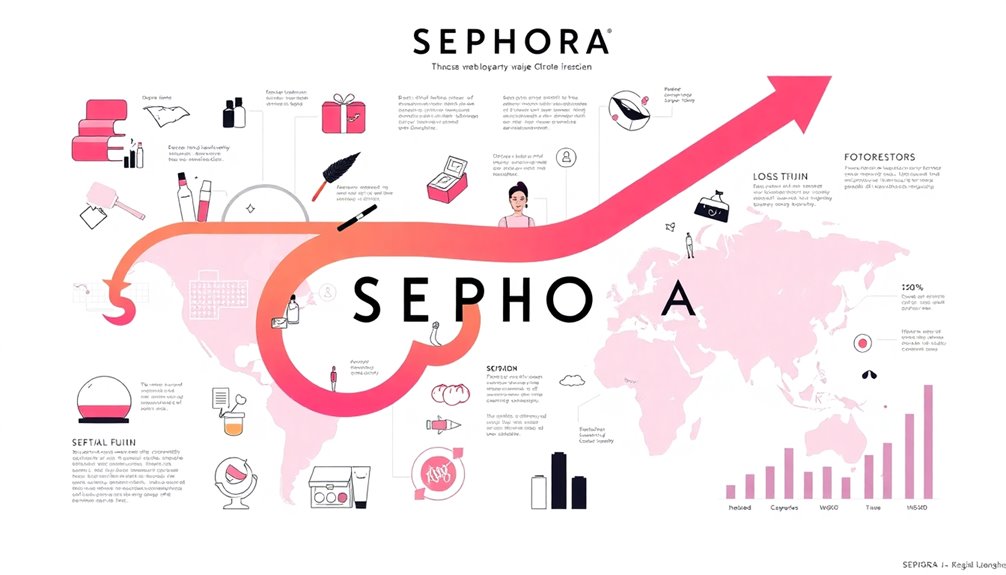
The beauty retail landscape transformed dramatically with Sephora's expansion and innovation strategies. In 1993, Dominique Mandonnaud merged his perfume business with Sephora, laying the groundwork for future growth. By 1997, LVMH Moët Hennessy Louis Vuitton acquired Sephora, enabling significant global expansion. You'd see this reflected in strategic partnerships with various brands, leading to exclusive product launches that drove traffic and revenue.
Sephora's innovative retail strategies set it apart. The "try before you buy" approach revolutionized how customers interacted with products in an open-sell environment. You could enjoy customized makeup sessions and receive expert advice from Beauty Advisors, enhancing your shopping experience. In 2020, Sephora's retail sales in the U.S. reached approximately $5.01 billion, showcasing its substantial market presence and popularity.
The introduction of the Sephora Collection in 1995 added to its unique offerings.
The brand also embraced digital transformation with the launch of its Innovation Lab in 2015. Integrating augmented reality and artificial intelligence improved customer engagement and personalized shopping experiences. A strong online presence, coupled with a mobile app, ensured seamless shopping across channels.
With a focus on customer-centric experiences and the Beauty Insider loyalty program, Sephora continually innovates to remain relevant, especially among younger customers.
Global Growth
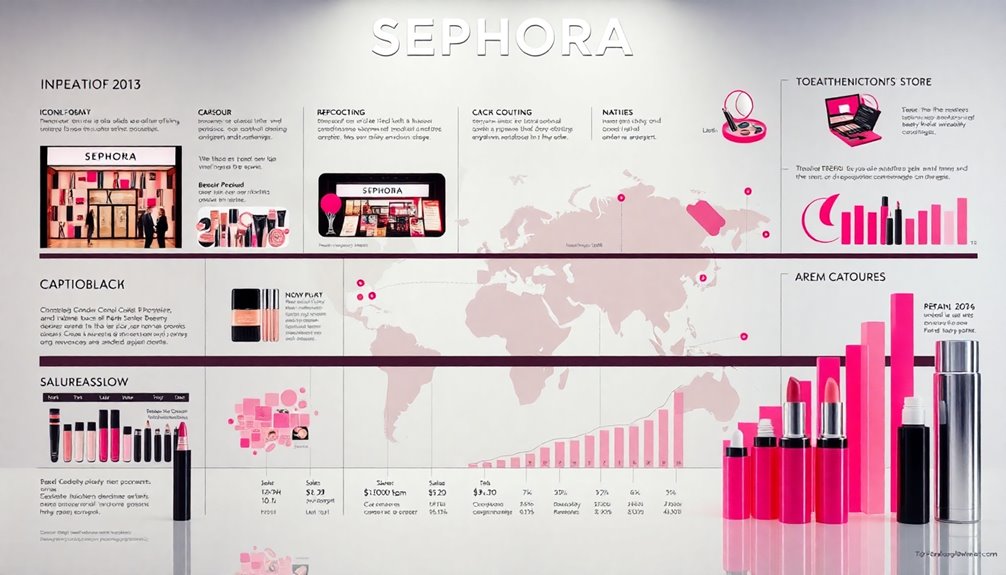
As a leading name in beauty retail, Sephora has achieved remarkable global growth since its establishment in France in 1970. Now, it operates in 35 countries, with significant footprints across North America, Europe, and the Middle East.
The first international flagship store opened in New York City in 1998, marking the beginning of its expansion beyond French borders. By 2007, Sephora established a notable presence in the Middle East, launching over 44 stores in the UAE and KSA.
In 2023, Sephora generated approximately 16 billion U.S. dollars in retail sales worldwide, showcasing its rapid revenue growth from just 14.5 billion U.S. dollars the previous year. U.S. market sales were particularly strong, accounting for nearly half of global sales, with nearly seven billion U.S. dollars reported in 2022 alone.
Sephora's online presence also flourishes, with its website ranking as one of the top beauty marketplaces on Google. The Beauty Insider Community enhances customer engagement and loyalty, while the mobile app, launched in 2010, has been downloaded around 4.8 million times in the U.S.
These strategic moves solidify Sephora's position as a global beauty powerhouse.
Retail Strategy and Partnerships
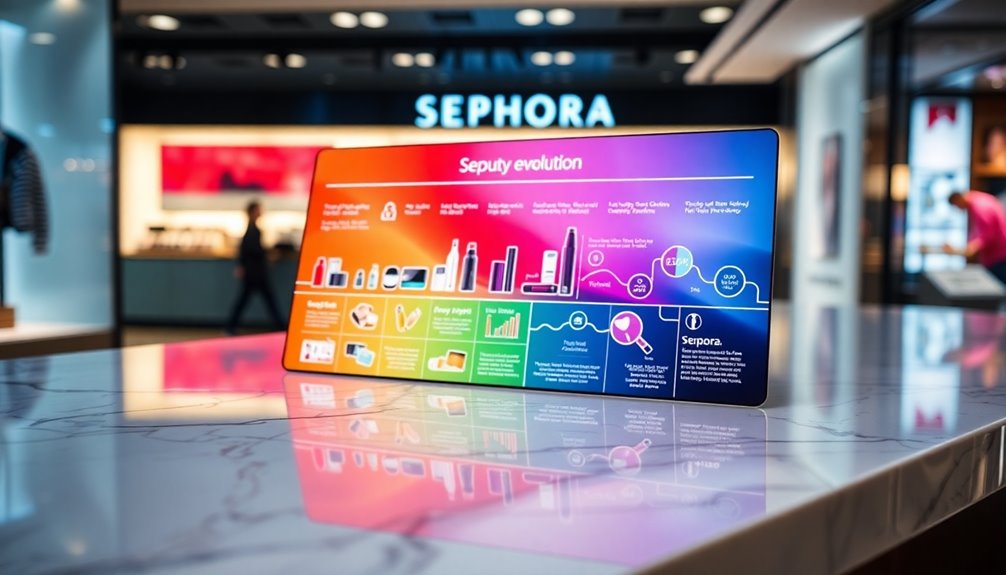
In today's competitive beauty retail landscape, effective retail strategies and partnerships play a crucial role in driving success. Sephora has excelled by implementing store-in-store concepts with major retailers like JCPenney and Kohl's since 2006, significantly increasing foot traffic for both parties. This approach encourages you to test products before purchase, enhancing your shopping experience.
Sephora's partnerships haven't only expanded its customer base but also elevated brand visibility. Collaborations with affiliates, influencers, and content creators through platforms like impact.com further amplify their reach. These strategic alliances facilitate entry into new markets and regions, making Sephora's products more accessible to you. Additionally, their extensive product range includes over 340 brands, allowing for a diverse selection that caters to various customer preferences.
Using a unified platform, Sephora streamlines partnership management with automated processes for approvals and performance tracking. Flexible contracting and in-depth reporting tools allow you to engage effectively with their partners, optimizing your experience.
Ultimately, these collaborations enhance your shopping convenience by combining multiple brands under one roof while driving significant revenue growth. By testing innovative marketing strategies, Sephora stays ahead of trends, ensuring you enjoy a fresh and exciting retail environment.
Leadership and Financials
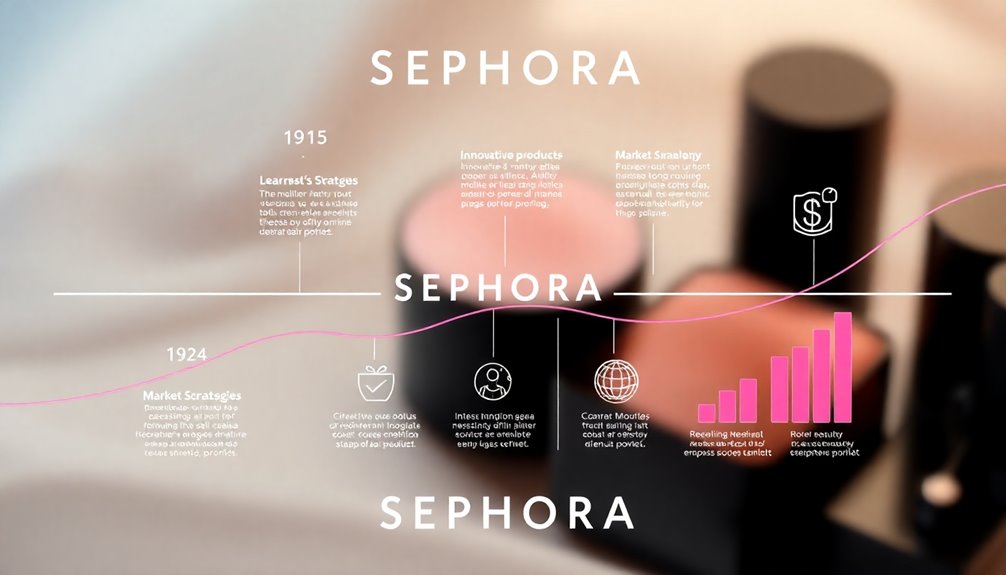
Sephora's success isn't just about innovative retail strategies; strong leadership and solid financial performance play a vital role, too. Founded in 1969 by Dominique Mandonnaud, Sephora established its roots in the perfume business. Today, Artemis Patrick, the current President of Sephora North America, is set to transition into the CEO role in April 2024, reporting to Guillaume Motte. The company's functional organizational structure, with C-level executives managing eCommerce and retail, underpins its operational efficiency.
Financially, Sephora generates up to $10 billion annually, with a remarkable 26% increase in selective retailing revenue in 2022. However, challenges like product cost inflation led to a 6.9% drop in comparable sales. Despite this, disciplined expense management resulted in a 3.3% reduction in administrative costs. Owned by LVMH since 1993, Sephora significantly contributes to the parent company's revenue, particularly in cosmetics. In H1 2024, Sephora's revenue growth was up 3%, reflecting organic revenue growth of 8% to £7.2 billion (€8.6 billion).
The average shopper spends over $30 monthly, fueling a rapid growth trajectory, especially in fragrances and makeup. LVMH's focus on innovation and quality continues to bolster Sephora's resilience in fluctuating economic climates.
Frequently Asked Questions
What Inspired Dominique Mandonnaud to Start Sephora?
Dominique Mandonnaud was inspired to start Sephora by his family's deep roots in the perfume business, which exposed him to the importance of customer experience.
He wanted to create a retail environment where you could test products before buying, breaking traditional barriers in shopping.
His innovative approach, combining product grouping and assisted self-service, aimed to enhance your shopping experience, making beauty accessible and enjoyable for everyone who walked through the door.
How Does Sephora Select Brands to Carry in Stores?
Sephora selects brands based on their uniqueness and innovation, ensuring they stand out in the crowded market.
You'll notice they prioritize high-quality products that deliver proven results and resonate with current trends.
Packaging plays a key role too; they seek brands with compelling stories and strong identities.
Sustainability matters, so brands must adhere to strict eco-friendly practices.
Ultimately, Sephora aims to create a diverse and exciting product range that meets consumer expectations.
What Are Sephora's Sustainability Initiatives?
Sephora's sustainability initiatives focus on promoting transparency and responsible product development.
You'll notice their "Clean at Sephora" and "Planet Aware at Sephora" labels, which ensure brands meet specific environmental criteria regarding ingredients and packaging.
Starting April 2024, these labels will roll out globally, helping you make informed choices.
How Does Sephora's Loyalty Program Work?
Sephora's loyalty program, called Beauty Insider, offers you different tiers: Insider, VIB, and Rouge, each with increasing benefits based on your spending.
It's free to join, and you earn 1 point for every dollar spent. As you spend more, you unlock perks like exclusive access, free shipping, and birthday gifts.
You can redeem points for rewards or donations. Engaging with the community and attending beauty classes adds even more value to your experience.
What Unique Shopping Experiences Does Sephora Offer In-Store?
Sephora offers a variety of unique in-store shopping experiences.
You can explore products on the Play Table, where you access reviews and details digitally. If you need assistance, expert beauty consultants are available to help.
The augmented reality mirrors let you try products virtually. Plus, with personalized services like the Care Table and The Make Up Bar, you can get tailored advice and quick makeovers, enhancing your shopping experience significantly.
Conclusion
In exploring Sephora’s journey, you can see how its innovative spirit and commitment to beauty transformed it into a global powerhouse. From its humble beginnings to strategic partnerships and an impressive retail strategy, Sephora continually adapts to meet customer needs. Its leadership drives financial success while maintaining a strong brand identity. As you look ahead, you can appreciate how Sephora’s evolution inspires both beauty enthusiasts and business minds alike, proving that passion and vision can lead to remarkable achievements. With a focus on customer experience and staying ahead of beauty trends, Sephora has also embraced the rise of influencer-led beauty products. By partnering with influencers like Marianna Hewitt, Sephora has continued to stay relevant and offer unique products to its customers. In fact, Marianna Hewitt’s new skincare brand, which launched exclusively at Sephora, is a perfect example of how the company embraces innovation and collaboration to meet the ever-changing demands of the beauty industry.
